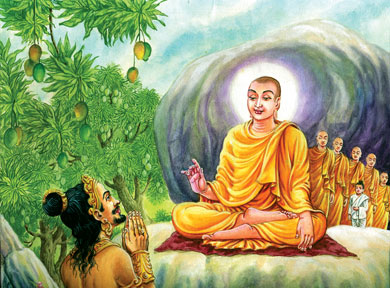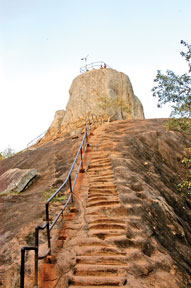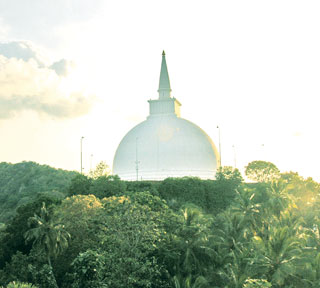Poson: Moment of spiritual awakening
by Kalakeerthi EDWIN ARIYADASA
 "O Great King, we are monks - disciples of the Monarch of
Righteousness. We have come over from "Jambu Dvipa" (India) with your
well-being in mind". (Ven. Arahant Mahinda Thera outlines His mission to
King Devanampiyatissa). "O Great King, we are monks - disciples of the Monarch of
Righteousness. We have come over from "Jambu Dvipa" (India) with your
well-being in mind". (Ven. Arahant Mahinda Thera outlines His mission to
King Devanampiyatissa).
Two thousand three hundred and fifty years ago, a dramatic encounter
took place, in the wilderness, in the vicinity of Anuradhapura. This was
the ritual Royal chase of the ruling monarch, who was out hunting with
his retinue, as part of the national spring holiday. He had decreed
water-sports nation-wide, and took to the chase, with forty thousand of
his men accompanying him.
He was shocked into disbelief, when someone called out to him by his
first name "Tissa". There was no one in the whole of his Kingdom, who
would have the audacity to call him by his first name.
It is then that Arahant Mahinda, explained his sacred mission to the
King. Mahawamsa, Sri Lanka's national historical chronicle, narrated in
those graphic terms, the tremendous spiritual event of the introduction
of Buddhism to Sri Lanka through the formal conversion of King
Devanampiyatissa to the dispensation of the Supremely Enlightened
Buddha.
Ven. Arahant Mahinda Thera conducted the first-ever IQ test in Sri
Lanka, when he asked the king a series of questions to assess the
monarch's intellectual stature, before the Arahant decided to expound
some profound concepts in the Buddhist system to this Ruler.
King Devanampiyatissa came through with "flying colours" - so to
speak. And, Ven. Arahant Mahinda became fully convinced that the mind of
the king was the right fertile soil to plant the noble teachings of the
Buddha. The King lavished all the offerings he could on Ven. Arahant
Mahinda and those holy individuals who came along with him.
 With surprising alacrity the process of converting the total island
to Buddhism took place. With surprising alacrity the process of converting the total island
to Buddhism took place.
There is in this mass conversion of the land into Buddhism, an aspect
of the culture of ancient Sri Lanka that needs scrutinising.
Prior to King Devanampiyatissa (247 - 207 B.C.) there were six
rulers, who held sway over those pioneering Aryan settlements, that
formed the ancient Kingdom of Sri Lanka.
All those rulers adhered to Hinduism. The Royal father of King
Devanampiyatissa was Mutasiva - quite clearly a Hindu name. His son
Devanampiyatissa, who succeeded him to the throne, was, without any
doubt an ardent Hindu ruler, to begin with.
Central issue
The central issue here is that King Devanampiyatissa altered almost
instantly, the two-century old Hindu tradition he was heir to, and
embraced fully and totally this new religion.
What was the dynamism, that prompted this ruler, to effect such a
dramatic change in his religious loyalty?
To my mind, the elite rulers of Sri Lanka were familiar with the
Buddha's doctrine of compassion all along.
In the instance of King Devanampiyatissa, he had cultivated an
"unseen" friendship with Emperor Asoka. This imperial friend would have
kept him fully informed about the Buddhist faith.
The Emperor sent his own son Ven. Arahant Mahinda Thera to Sri Lanka
primarily because of this intimate "unseen" bond that existed between
the Emperor and the King. Sri Lanka was a privileged land, without even
the trace of a doubt, in the scheme of the Emperor's campaign to conquer
men by compassion. He sent out Buddhist missionaries to all parts of his
far-flung Empire.
The Emperor's prioritisation of Sri Lanka, in his campaign of
compassion, is further strengthened by his decision to send his daughter
Bhikkhuni (nun) Sangamitta to Sri Lanka, bearing the sacred gift of the
sapling from the sacred Bodhi Tree at Buddhagaya.
It is quite valid to assume, that the Hindu system that existed in
Sri Lanka prior to the conversion of King Devanampiyatissa, had not
taken firm root in Sri Lankan society.
Had there been a strongly entrenched religious tradition in Sri
Lanka, prior to the arrival of Ven. Arahant Mahinda with his supreme
message of Buddhism, the dispensation of the Supremely Enlightened
Buddha would not have had an opportunity with that speed. Besides, there
is no record whatsoever of people resenting the establishment of the new
religion. This must invariably be because there was no entrenched system
of faith that held sway over the people.
 The arrival of Buddhism in Poson, determined the moment in which one
nation matured into a land with a clearly discernible cultural identity.
Arahant Mahinda's introduction of Buddhism, provided the nucleus around
which this gentle and kind culture could eventually form. The arrival of Buddhism in Poson, determined the moment in which one
nation matured into a land with a clearly discernible cultural identity.
Arahant Mahinda's introduction of Buddhism, provided the nucleus around
which this gentle and kind culture could eventually form.
Holy venue
In consequence the Poson Full Moon Day enables us to remember that
historical Poson Full Moon Day in the reign of King Devanampiyatissa
when we awoke into a national and religious culture of our own. From
there our rites and rituals, our mores, came to be determined by the
system brought to us as a sacred gift by Ven. Arahant Mahinda Thera.
The holy venue in which this defining moment took place was
originally characterised as Ambatala (Mango Rock) as it was in a massive
mango grove.
Later on the rock assumed the name Mihintala (the Rock of Mahinda).
One cannot help but note an intriguing historical development relating
to the name of this rock. Mahinda Rock (Mihintala) seems to have created
a problem to the Venerable author of Mahawamsa. He wrote his work in
Pali. In many an instance, he translated the original names into Pali.
When he compiled the national chronicle about five centuries after
the sacred visit of Ven. Arahant Mahinda, the author had forgotten the
process through which the name Mihintala came into being. He took the
first segment of the name Mihin to signify "mixing" (there is a Sinhala
expression "Muhun" - to mix). The second segment "Tala" (rock) did not
offer any obstacle. In that context he gave the Pali version "Missaka
Pabbata" to Mihintala, unaware that Mihindu meant "Mahinda Rock".
The greater irony is that some tend to translate 'Missaka Pabbatha"
back to Sinhala as "Musu-pavva" totally forgetting that they are talking
about Mihintala.
This irony grows. Some translate it into Missaka Parvata, giving it a
Sanskrit version.
Whatever the name, on that historical Poson day this rock became the
perpetual monument of the awakening of this land into a cultural
identity of its own. |

